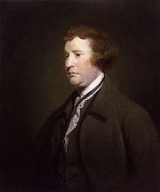
statesman, author, orator, political theorist and philosopher who, after moving to England, served for many years in the House of Commons of Great Britain
as a member of the Whig party.
He is mainly remembered for his support of the cause of the American Revolution
aries, and for his later opposition to the French Revolution
. The latter led to his becoming the leading figure within the conservative faction of the Whig party, which he dubbed the "Old Whigs", in opposition to the pro–French Revolution "New Whigs", led by Charles James Fox
.
Burke was praised by both conservatives and liberals in the 19th century.
There is a sort of enthusiasm in all projectors, absolutely necessary for their affairs, which makes them proof against the most fatiguing delays, the most mortifying disappointments, the most shocking insults; and, what is severer than all, the presumptuous judgement of the ignorant upon their designs.![]()
Laws, like houses, lean on one another.![]()
There is, however, a limit at which forbearance ceases to be a virtue.![]()
It is a general popular error to suppose the loudest complainers for the publick to be the most anxious for its welfare.![]()
The wisdom of our ancestors.![]()
Toleration is good for all, or it is good for none.![]()
I take toleration to be a part of religion. I do not know which I would sacrifice; I would keep them both: it is not necessary that I should sacrifice either.![]()
Your representative owes you, not his industry only, but his judgment; and he betrays instead of serving you if he sacrifices it to your opinion.![]()
People crushed by law, have no hopes but from power. If laws are their enemies, they will be enemies to laws; and those who have much to hope and nothing to lose, will always be dangerous.![]()

